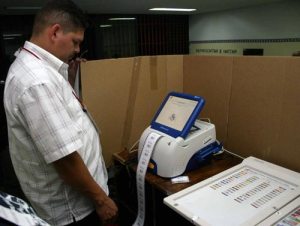
Manual voting sequence in Paraguay
After a year of strong political tensions following the impeachment of president Fernando Lugo, Paraguay went to the polls on April 21 to choose a new Head of State, a Vice-president, deputies and senators, departmental authorities and the country’s representative in Mercosur. The voting resulted in Horacio Cartes being elected as president, but it also represented the beginning of what can be a reform in the electoral system.
The Electoral Justice chose to create a commission in charge of presenting the nation with technical modifications to the voting process, in order to make it safer and more transparent. Currently the nation uses manual voting and its quick counting process does not have a good reputation.
The general elections that took place a few days ago, despite being certified by national political figures and international observers alike, were heavily criticized due to violations of the norms, vote buying, “voter herding”, lack of impartiality by electoral magistrates and other vices typical to manual voting. Even the high number of null and blank votes, which together were the 4th most voted option, showed the need for changes in the near future.
In addition to these irregularities, the constitution of a special team with the task of reforming the system was also motivated by the debut of the Digital Transmission of Preliminary Precinct Counts (TREP in Spanish) system. The reports show that this mechanism devised to speed up the collection of results collapsed. The system was supposed to digitalize the precinct counts so they could be transmitted via Internet with the help of CTX (Transmission Centers X): a laptop, a modem and a scanner. The method, however, was inefficient.
Carlos María Ljubetic, assistant to the Superior Electoral Justice Court (TSJE), stated that the commission will evaluate the technical aspects of voting, as well as the logistics and organization, to later turn all proposals into law. This public servant does not rule out that Paraguay will work towards automating its elections, so an e-voting could carry significant weight among the suggestions presented by the multidisciplinary team,
Paraguay won’t settle, but rather is looking to evolve to give its 3.5 million voters a system that safeguards their will, facilitates civic participation and guarantees results. 2015 could be a year of renovation for the country.

